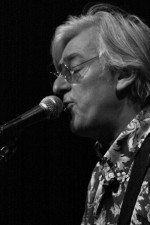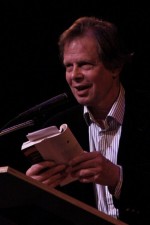
Robyn Hitchcock at MASS MoCA
CHINESE WHITE BICYCLES
with Robyn Hitchcock and Joe Boyd
Hunter Center
MASS MoCA
North Adams, Mass.
March 12, 2011
Review by Seth Rogovoy
(NORTH ADAMS, Mass., March 12, 2011) – Both Joe Boyd and Robyn Hitchcock have had remarkably storied careers in rock music – the former primarily as a producer (as well as a record label executive and A&R man; an engineer; and a tour manager) and the latter as a cult-icon performer and recording artist. As they made clear in their charming duet program, Chinese White Bicycles, at MASS MoCA’s Hunter Center on Saturday night, Hitchcock’s career in many ways picked up on much of Boyd’s early work (both continue today as active, vital forces in rock), and they served as complementary foils in a combination program of music and storytelling focusing largely on the nascent English psychedelic folk-rock scene in the mid- to late-1960s that Boyd helped engender and from which Hitchcock emerged.
Something of a Zelig-like figure in rock, Boyd assumed the role of storyteller, basing his real-life insider tales on his music industry memoir, White Bicycles. For the purposes of this program, Boyd limited himself largely to the few years leading up to the explosion of English psychedelic folk-rock, most prominently heard in the early work of Pink Floyd. But along the way Boyd worked with such seminal, influential figures as the Incredible String Band, the Move, Nick Drake, and Fairport Convention. With his front-row seat in the establishment of these artists’ careers, Boyd had a wealth of anecdotes into behavioral eccentricities as well as artistic processes, but also was able to offer a unique cultural context and perspective for these artists and those they influenced that occasionally resulted in mind-boggling surprises.

Joe Boyd
For example, in discussing the seminal English folk-rock group Fairport Convention, Boyd argued for a surprising revisionist history: that rather than a collective of English-minded revivalists, the founding members of Fairport, including Simon Nicol, Ashley Hutchings, Martin Lamble, and Richard Thompson, looked to American roots music for inspiration in the same manner of their contemporaries in the American rock group the Byrds and the Band. But according to Boyd, the Band’s debut album, Music from Big Pink, had such a huge impact on the British music scene upon its release, that the members of Fairport recognized that there was no way that they could ever come close to achieving the sort of creative fusion of American roots music and rock ‘n’ roll that the Band pioneered, and so therefore they decided to look in their own backyards for music upon which to build a new sound – hence, the very English folk-rock of Fairport’s album, Liege and Lief.
Even more surprising, however, was Boyd’s passing along a tidbit gleaned from David Hidalgo, a cofounder and co-leader of the Mexican-American rock group Los Lobos. This group has always wore its debt to the Band on its sleeve – as sort of a south-of-the-border equivalent of the Band’s north-of-the-border approach (four-fifths of the Band’s personnel were Canadian).
But according to Boyd, Hidalgo asked him to pass along a message of thanks to Fairport, saying that if it hadn’t been for Liege and Lief – and, presumably, the lessons inherent in that album, that one could draw upon the traditional music of one’s heritage to make for a new and vital folk-fusion – Los Lobos, which initially gained renown precisely by mining its Mexican heritage and combining it with rock ‘n’ roll influences — would forever have been stuck in East Los Angeles playing heavy-metal rock.
It’s a whiplash of a concept – that in fact it took an English folk-rock band, one that arguably no one would have ever connected to Los Lobos – to wake up the group to an approach ostensibly suggested to it by an American ensemble, which would eventually see Los Lobos collaborating with the Band’s singer/drummer Levon Helm on occasion and inheriting the mantle of the Band’s soulful American roots-rock approach based upon tradition.
But before Boyd got anywhere close to Fairport, he spent a good half hour recounting his front-row view of key moments in the very birth of folk-rock in the hands of Bob Dylan himself, as Boyd was present at the Newport Folk Festival of 1965 when Dylan infamously “went electric.” Suffice it to say that Boyd’s version of the oft-told events of that weekend differ greatly in nuance from the conventional story – and his bear the stamp of believability as his story, as are all his anecdotes, are imbued with a true storyteller’s gift of imparting personality. And Boyd truly brought to life the personality of many of the key players at Newport, including Alan Lomax, Pete Seeger, Albert Grossman, Peter Yarrow, Bob Dylan – and, as it turns out, Joe Boyd, who was charged by Lomax with turning down the volume on Dylan’s electric set, but who deflected the order (with support by Grossman and Yarrow) with impish humor and cunning.
As Boyd’s musical foil for the evening, Hitchcock, who in addition to being known for his own work with the Soft Boys and the Egyptians as well as for his solo work and for his many collaborations with other artists, has a reputation for being a rock ‘n’ roll encyclopedist, provided brilliant musical illustrations to go along with Boyd’s anecdotes, delivering renditions of songs by Bob Dylan, Nick Drake, Syd Barrett, the Incredible String Band, and the Move that were at once dead-on and accurate yet also simultaneously revealed how these groups influenced his own sound and approach. If the evening was weighted timewise toward Boyd’s lengthy but never draggy stories, Hitchcock’s musical interpolations carried half the impact and half the weight.
The nearly two-hour program went by seamlessly and in a breeze, and a listener was left marveling at the charm and skill of both storyteller and performer, and wondering how many other stories and musical periods they might highlight in future such programs, Boyd’s career also including key roles with R.E.M., 10,000 Maniacs, Billy Bragg, Toots and the Maytals, as well as a surprising number of world music artists.
This review only touches on a few of the terrific tales that Boyd imparted about the artists. There were plenty of jokes, quirky anecdotes, fun give-and-take between Boyd and Hitchcock, and a mind-blowing story involving the Incredible String Band, Boyd’s greatest commercial success, which had as a punch line none other than Scientology – and this before the decade changed from 1969 to 1970. It was as apt a metaphor of several of the others Boyd and Hitchock proposed for the generational and cultural change that divided those decades, another being the difference between marijuana and cocaine, and the more poignant one being the lost spirit of the music itself as it became a commodity sold by corporations – and not something that grew organically out of the many London nightclubs that peppered Boyd’s tales and a scene and bands that were nurtured by unique, visionary figures like Brian Epstein (the Beatles), Andrew Loog Oldham (the Rolling Stones), Peter Rudge (the Who), Peter Grant (Led Zeppelin) …. and Joe Boyd.
Seth Rogovoy is Berkshire Living’s editor-in-chief and award-winning music critic.









